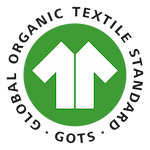- Clothes
- Bags
- Accessories
-
Inspiration
- Shoes
Better Cotton Initiative

Better Cotton Initiative (BCI) is a non-profit organization that is committed to making cotton cultivation more sustainable and fairer worldwide.
This certification is therefore only relevant for the cultivation of cotton, and not for other parts of the production chain.
How BCI scores on a scale of 1 to 4
Find out what's the story behind your clothing by understanding the certificates. Use the scores to discover at a glance what a certificate means in different sustainability areas.
Cotton has a share of approximately 24.3 percent of the total fibre market. -Textile Exchange
Eco-Friendly
BCI has several rules for farmers who are affiliated with them. These rules vary depending on the size of the farm. In addition to the criteria that the farmers must absolutely adhere to, there are also criteria for improvement. The criteria that we deemed most important are:
- Pesticide use must be reduced and farmers must be less dependent on pesticides. There are strict rules about which pesticides can be used.
- There must be a water protection plan to ensure sustainable water management.
- The soil must be handled in a healthy manner.
- Biodiversity must be dealt with sustainably, by preserving biodiversity in neighbouring areas, releasing beneficial insects, rotating plants and protecting vulnerable areas.
- The cotton must be properly harvested and stored so that the quality stays high and as much cotton that is harvested can be used.
Score: 3/4 BCI has strict rules in all areas for making cotton production more sustainable. They were not given 4/4 because pesticides and GMOs may still be used.
Fair Trade

BCI has strict rules for the working conditions of the farmers and their employees. Again, these rules vary for the size of the farm. The main criteria of their standard are:
- No child labour (children under 15, or children under the minimum working age in that country, whichever is the higher).
- No heavy/dangerous work for people under 18 years old.
- No forced work.
- No discrimination.
- Equal pay for people doing the same type of work.
- Good facilities such as toilet, lunch and medical.
- Safe and healthy conditions.
- It must be possible for the workers to form unions and organizations.
- No less may be paid than the legal minimum wage.
- Employees have a contract.
Score: 3/4 These are strict rules regarding working conditions, but paying a living wage is not mandatory. Because of this, it did not get a full score.

Animal welfare/Vegan
BCI is only about the cultivation of cotton. In general, no animals are used for this and there are therefore no rules about animal welfare.
Score: 0/4 Animal welfare does not apply to cotton cultivation.
Reporting and improvement
BCI certified companies are encouraged to keep improving. That is why, for each part of the Standard, there are both core values that farmers must really comply with, as well as areas for improvement for which the farmers can earn extra points. Certified companies must keep improving.
The reports containing the requirements of the certified companies are not shared publicly.
Score: 2/4 The reports are not shared publicly, which results in less transparency. If the reports were shared, we would assign a full score here.
Auditing
The parties affiliated with BCI are audited by a third independent party.
Score: 4/4
When you buy something that contains BCI certified cotton it is important to realize that they work with a Mass Balance system. This means that they don't really keep track of which product the cotton ends up in. After the production, the BCI cotton is thrown together with all the other cotton from the region and processed together into a fabric. It is therefore very possible that a brand that uses BCI cotton sells a T-shirt where only 10% really comes from the BCI farmers.
But you also have brands that do not use BCI cotton, but where some of the cotton in their products come from BCI farmers. This is because BCI works with 'cotton credits'. For any amount of cotton their BCI farmers produce, the same amount of cotton can be sold to brands as BCI cotton. So the same amount of BCI cotton is produced as is sold, and by buying BCI cotton shirts you do contribute to stimulating more BCI certified cotton.


